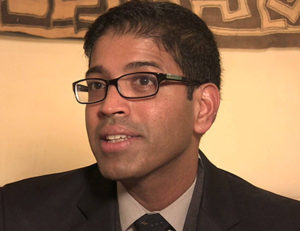George Pappachen is an executive who has worked on both sides of the consumer privacy relationship. He was the first Global Chief Privacy Officer for advertising and marketing multinational WPP, as well as leading business strategies at the group’s data divisions Kantar Media and Data Alliance. George, now EVP Corporate Development at data insight firm Research Now, spoke to Internet of Me about the personal data economy and the state of ad tech.
IoM: You’ve been a Chief Privacy Officer as well as driving bus development for data-driven companies. What’s your view of the state of the personal data economy and how do you see it developing?
GP: I’ve long held the position that the personal data economy won’t come to full fruition until the consumer is informed about how they can participate in the marketplace. Over the last five to10 years the marketplace without the consumer has evolved to enable more personalisation and customisation with the use of data. In a lot of ways the advertising and marketing industry have been in the forefront because some of the more regulated industries like finance and healthcare are much more deliberative in the process of using data at scale.
The overall marketplace will move well beyond advertising and marketing towards the broader marketplace using data and deliberately and methodically absorbing more and more personal data to manage the relationship with consumers. We’re nowhere near the mature point of the personal data driven marketplace, but it’s well on its way. The real question is how soon consumers can be brought in to a position of being informed participants.
IoM: So the economy is balanced in favour of businesses – how do you see the consumer being ‘brought in’ and given more agency?
GP: You have to go to the things that matter to consumers. I think if you took a survey people would say privacy and data protection are important to them – I’m not sure they understand what the differences and nuances are perhaps – but I think what matters to them is around a better price, more convenience and also where it can really empower them. I think the opportunity begun earlier on with companies that were what you might call data wallets or data stores for consumers but I think the opportunity now is where the middle men that largely serve industry are now able to serve consumers in a way where the process flow is not incredibly complicated for consumers.
The opportunity that business delivers around convenience and better price is something that consumers can participate in.
IoM: What do you think about giving consumers control over their data, with personal data stores and layers of consent? Do you think such a shift could be seen by businesses as an opportunity for competitive advantage through attractive services and business models?
GP: Think idea of giving consumers control is a good one – not many people would argue with that. But where the rubber meets the road is around two things: First, giving control unilaterally where the consumer is not paying anything for service and in that case data is the exchange, and other point is the categories of information or the mechanism of consent – opt-in consent, presumed consent, implied consent or presentation of choices with the consumer having the option to activate or not.
IoM: In Europe we obviously have the GDPR coming which places explicit consent at the heart of data protection legislation. There is quite a difference in attitudes towards data protection between Europe and the US, so do you see GDPR as a positive, progressive thing or a problem for businesses?
GP: I think it can be a progressive thing if the informed people and industry come together. With the European-wide directive a while back around cookies, the implementation or regulation at the member country level was varied and led to, I think, an ineffective approach overall. This one is not a directive it’s a regulation, I understand that and there’s been a lot more central coordination and the execution will be much more aligned. That said, I think there are still a lot of elements to be defined.


Can a third party get that consent from a single location for multiple use cases? Can maybe a platform extend consent to multiple thirds parties? What is the nature of the icons or categories or the taxonomy that will explain to consumers in an understandable way what they are consenting to?wê
IoM: Do you think big businesses that hold lots of data for comp advantage and consider it an asset can come wound to idea that giving back data and giving consumers more control is opportunity an opportunity for them?
GP: Ironically, I think the bigger businesses will be more open to that than the middle to smaller-sized businesses. For example, I think an Amazon or a Google or a Facebook will be a lot more open to the idea of giving back data because their have so much of it and they intrinsically believe that giving back means more engagement with consumers.
I think the engagement factor is so much more in their favour.
IoM: Tech giants like the Big Four – Google, Amazon, Apple and Facebook – are often cast as the villains when it comes to how our data is used. Is that fair?
GP: They are always the ones seen to be reticent, but my forecast is that in 2018/19 they will be the ones that transition to give consumers the view into what they have – now, there will be constrentain about how that’s presented – but they will be more open to it because the bigger picture is that it’s to their favour.
IoM: As well as the Big Four, the ad tech industry and digital marketing itself is a sector gets bad press – it’s seen as responsible for scraping data, tracking and targeting køb viagra. What do you think is the state of health for ad tech and how will it move forward?
GP: In digital marketing Google and Facebook hold 60 or 70 per cent of the spend and about 80 to 90 per cent of the growth in that area. So for all of the ad tech companies that are struggling to win share in today’s marketplace, it all comes down to the level of coverage you have through the explicit first party data.
Patching together various pieces of information really needs verification and validation because so many of the digital traces are removable by consumers or are disconnected. I think they will want the first party data connection in order to improve the output of their processes and the valuation of their businesses. I think it’s all moving to a much more coherent system that is connected to opted-in permissioned first party data.
IoM: So they will do more to bring in consumers for that one-to-one relationship potential?
GP: The parties that have that first party engagement with consumers and the permissions they gain – that is going to be very, very important. Along with the GDPR, the regulators are going to have to figure out ways to loosen up the data from the handful of global operators that manage a lot of the first party relationships to make that a much more egalitarian system with the consumers involved.
IoM: How important are events like Personal Data Week in the context of discussions like this?
Events like this are necessary to really get the viewpoints from the different parties because this area of data and technology is a huge area of growth for the world. Consumers are benefitting, but to some extent there are consumers who are left out – that is an economic conversation. It’s good to hear those economic viewpoints while we talk about how the fundamental rights of consumers and businesses can co-exist.
I’m excited about it just because of the fact that it offers such a diversity of voices that will be needed to manage the data economy. That’s exciting to me because that’s how this economy will thrive and consumers have to be a part of it.

